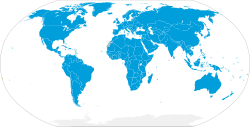United Nations
United Nations
| |||||||||||||||||||||||||
|---|---|---|---|---|---|---|---|---|---|---|---|---|---|---|---|---|---|---|---|---|---|---|---|---|---|
 Members of the United Nations (blue) | |||||||||||||||||||||||||
| Headquarters | New York City (international territory) | ||||||||||||||||||||||||
| Official languages | |||||||||||||||||||||||||
| Type | Intergovernmental organization | ||||||||||||||||||||||||
| Membership | 193 member states 2 observer states | ||||||||||||||||||||||||
| Leaders | |||||||||||||||||||||||||
| António Guterres | |||||||||||||||||||||||||
| Amina J. Mohammed | |||||||||||||||||||||||||
| Volkan Bozkır | |||||||||||||||||||||||||
| Mona Juul | |||||||||||||||||||||||||
| Dang Dinh Quy | |||||||||||||||||||||||||
| Establishment | |||||||||||||||||||||||||
• UN Charter signed | 26 June 1945 | ||||||||||||||||||||||||
• Charter entered into force | 24 October 1945 | ||||||||||||||||||||||||
The United Nations (UN) is an organization between countries established on 24 October 1945 to promote international cooperation. It was founded to replace the League of Nations following World War II and to prevent another conflict. When it was founded, the UN had 51 members. Now there are 193. Most nations are members of the UN and send diplomats to the headquarters to hold meetings and make decisions about global issues.
The goals of the United Nations are:
- To keep world peace.
- To help countries cooperate.
- To reduce poverty amongst its members
- To improve living conditions for people all over the world.
- To make the world a better place.[2]
History
[change | change source]After World War I, the nations of the world formed the League of Nations. The organization was a place where nations could talk through their differences calmly. However, some countries like Germany, Italy, and Japan ignored the League. They tried to solve their problems through war. Members of the League of Nations did not want to go to war to protect other members and so it failed. World War II soon started.
The Allies of World War II often called themselves "the United Nations" since they were united against the Axis Powers. After the war, the winners formed a new organization for world peace. On 25 April 1945 in San Francisco, they decided on the name '"United Nations". In June, they signed the United Nations Charter and decided how the organization would work. The UN was created on 24 October 1945, and its first meeting was held in January 1946. Since 1947 24 October has been called “United Nations Day”. The only country whose flag is modeled after the United Nations is Somalia.[3]
Headquarters
[change | change source]The United Nations is based in New York City, United States, except for the International Court of Justice, which is in The Hague, Netherlands. The leader of the United Nations is called United Nations Secretary-General.
Activity
[change | change source]The UN's main buildings are in New York City. The UN also has offices in Geneva, Switzerland, Kenya, and Austria. The UN tries to be peaceful but it has been involved in armed conflicts. In the 1950s during the Soviet boycott of United Nations Security Council, the UN supported South Korea in a war against North Korea. In the 1990s, the UN helped to force Iraqi soldiers out of Kuwait. At other times, the UN has built peacekeeping forces. They travel to conflicted places in the world to keep the peace. In the 2020s there have been UN peacekeepers working in Cyprus, Lebanon, the DRC, Central African Republic, Pakistan, and several other countries.
Through a series of goals, resolutions and declarations the United Nations has a set of commitments, actions, and goals to stop and reverse the spread of HIV and scale up towards universal access to HIV prevention, treatment, care, and support services.
Some of the UN's main work involves the Sustainable Development Goals. These goals, sometimes called the Global Goals, were adopted by the General Assembly in 2015. These 17 goals are based around ending poverty and hunger, making people more equal, and taking action to stop climate change.[4] UN agencies such as UNHCR, WFP, UNICEF, IOM and others are essential in delivering humanitarian assistance.
Divisions
[change | change source]The United Nations has six "principal organs":
| UN General Assembly - Deliberative assembly of all UN member states (each country has one vote) |
UN Secretariat - Administrative organ of the UN |
International Court of Justice - Universal court for international law (based in The Hague) | ||||
|
|
| ||||
| UN Security Council For international security issues |
UN Economic and Social Council For global economical and social affairs- |
UN Trusteeship Council Administered trust territories (currently inactive) | ||||
|
|
| ||||
There are special agencies of the United Nations. They are independent of the UN secretariat, with their own budgets and memberships.[6] Some of them are older than the United Nations. Here are a few of them:
- The World Health Organization (WHO)
- The Food and Agriculture Organization (FAO)
- The United Nations Educational, Scientific and Cultural Organization (UNESCO)
- The International Labour Organization (ILO)
- The International Monetary Fund (IMF)
- The World Meteorological Organization (WMO)
The United Nations also has funds and programmes. Unlike specialized agencies, these are reliant on voluntary contributions, or money that countries can choose whether or not to give to.[6]
- The United Nations Children's Fund (UNICEF)
- The United Nations Environment Programme (UNEP)
- The United Nations Development Programme (UNDP)
- The UN World Food Programme (WFP)
- The UN Refugee Agency (UNHCR)
Related pages
[change | change source]References
[change | change source]- ↑ Official Languages Archived 12 July 2015 at the Wayback Machine, www.un.org. Retrieved 22 May 2015.
- ↑ "Introduction to the United Nations". United Nations. 2011. Archived from the original on April 10, 2011. Retrieved April 7, 2011.
- ↑ Tittemore, Brian D. "Belligerents in blue helmets: applying international humanitarian law to United Nations peace operations." Stan. J. Int'l L. 33 (1997): 61.
- ↑ "Home". United Nations Sustainable Development. Retrieved 2023-03-16.
- ↑ Charter of the United Nations - Chapter III (Organs)
- ↑ 6.0 6.1 "UN System". United Nations. Retrieved 2023-03-16.
Notes








